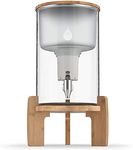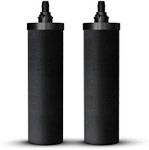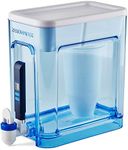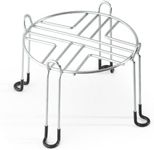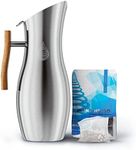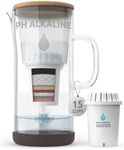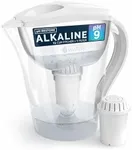Buying Guide for the Best Gravity Water Filter
Choosing the right gravity water filter is crucial for ensuring access to clean and safe drinking water, especially in situations where traditional water sources may be compromised. Gravity water filters are portable, easy to use, and do not require electricity, making them ideal for camping, hiking, or emergency preparedness. When selecting a gravity water filter, consider the specific needs of your situation, such as the volume of water you need to filter, the types of contaminants you need to remove, and the ease of use and maintenance of the filter.Filtration CapacityFiltration capacity refers to the amount of water a filter can process before it needs to be replaced or cleaned. This is important because it determines how long the filter will last and how much water you can purify with it. Filtration capacities can range from a few hundred gallons to several thousand gallons. If you need a filter for occasional use, a lower capacity may suffice. However, for regular use or larger groups, a higher capacity filter will be more efficient and cost-effective in the long run.
Filter TypeThe filter type indicates the technology used to remove contaminants from the water. Common types include ceramic, carbon, and hollow fiber filters. Ceramic filters are effective at removing bacteria and protozoa, carbon filters are great for improving taste and removing chemicals, and hollow fiber filters are known for their high flow rate and ability to remove a wide range of pathogens. Choose a filter type based on the specific contaminants you are concerned about and the quality of the water you will be filtering.
Flow RateFlow rate is the speed at which water passes through the filter, usually measured in liters per minute. A higher flow rate means you can filter water more quickly, which is important if you need to purify large amounts of water in a short time. However, higher flow rates can sometimes mean less thorough filtration. Consider your patience and the urgency of your water needs when choosing a flow rate. For leisurely activities like camping, a slower flow rate might be acceptable, while for emergency situations, a faster rate could be more beneficial.
PortabilityPortability refers to how easy it is to transport and set up the gravity water filter. This is crucial if you plan to use the filter in different locations or need to carry it with you on hikes or trips. Lightweight and compact designs are ideal for backpacking, while larger, more robust models might be better suited for base camps or home use. Consider how often you will need to move the filter and the space available for carrying it when making your choice.
Ease of MaintenanceEase of maintenance involves how simple it is to clean and maintain the filter to ensure it continues to function effectively. Some filters require regular cleaning or backflushing to prevent clogging, while others might need filter replacements. A filter that is easy to maintain will save you time and effort, especially in remote locations where resources are limited. Consider your willingness and ability to perform maintenance tasks when selecting a filter.
